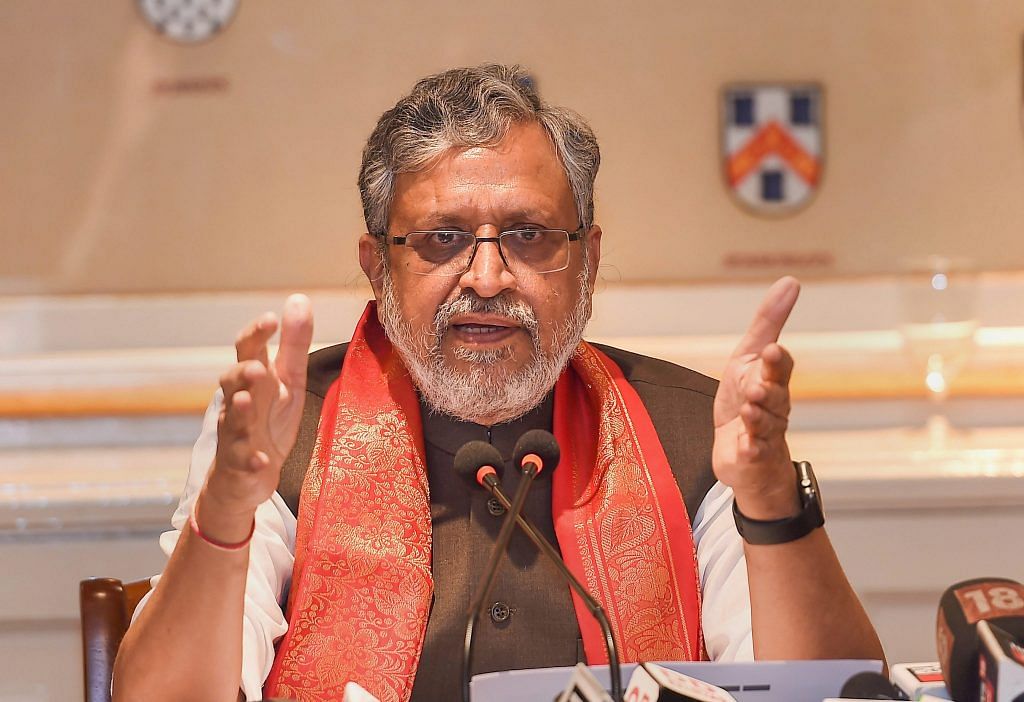Patna: People want a prime minister who can respond to the enemy in its language, Bihar Deputy Chief Minister Sushil Modi has said, adding that Narendra Modi had given the Army a free hand to “avenge” the Pulwama terror attack.
“We are seeking votes in the name of Modi’s performance. As far as Balakot (air strike on terror camp in Pakistan) is concerned, that’s also part of his work,” the veteran BJP leader said in an interview to ThePrint Wednesday evening. “The Army takes action only when the political leadership instructs it or gives it the freedom to act.”
Twelve days after 40 CRPF personnel were killed in a terror attack in Pulwama, Indian jets had crossed over to Pakistan to bomb a terrorist training camp in Balakot on 26 February. The BJP has made it one of its central poll planks to buttress Modi’s image as a strong and decisive Prime Minister. The opposition parties have been criticising the BJP for what they see as the ruling party’s attempt to politicise the Indian army for political gains.
“The most clapping (during speeches) we get is when we mention national security. We hardly speak about Balakot for 3-4 minutes in 30 minutes…. (For the rest) we speak about toilets, Jan Dhan scheme, direct benefit transfer and many other things Narendra Modi has done,” the Bihar deputy chief minister said.
“We mention national security for only five minutes but (we get) maximum clapping, maximum support when we mention Balakot.”
‘BJP will act on Ram temple only if consensus among allies’
The veteran BJP leader also suggested that the NDA, if it got a renewed mandate, would take a decision on the construction of a Ram temple in Ayodhya or the abrogation of Article 370 and 35A — the last promise made in its election manifesto — only if there is a consensus among the allies.
“The BJP will form the government in a coalition and so we cannot implement it (abrogation of Article 370 and 35A) unless there is consensus,” Sushil Modi said. “Narendra Modi has already said that though we will get a majority, we will form the government along with our alliance partners. So, we will have to work as per the common minimum programme.
“The BJP has already said on the Ram temple issue that it should be decided by the court or settled through negotiations,” he added. “If we get a majority, we will make a mili-juli sarkar (coalition government) with allies. We will have to identify issues where there is a consensus.”
Also read: At BJP convention, Amit Shah raises poll pitch with Ram temple but skips heartland losses
Modi, a symbol of both mandal and kamandal
Sushil Modi predicted a bigger wave in favour of the BJP than in the last general elections. In 2014, people had seen Narendra Modi only as the Gujarat chief minister who ran a good government and had a clean image.
“There was anti-incumbency against the Manmohan Singh government and people voted for him (Modi). In 2019, people have seen him as a performer for five years,” Modi said. “For instance, Raymond is a good brand. When people use it, they become its fan or say it’s useless. In 2014, people saw Modi from a distance. Now that they have seen him closely, they feel he should be given another chance.”
As for the opposition parties’ hope of winning the elections by forging alliances of parties representing different caste groups, the Bihar deputy chief minister was of the view that it wouldn’t work anymore.
“Narendra Modi is a symbol of both mandal and kamandal,” he said, explaining that the BJP has shed its image of being an upper caste, urban-centric party, which had earned it the kamandal tag.
“We were then projected as anti-reservationist. But in the last 15-20 years, we have changed our image… (by giving representation to) to backward classes, extremely backward classes and Mahadalits,” he said. “We are pro-reservation and favour reservation at all levels.
“Ek jamaana tha ki mandal aapke pass, kamandal hamare paas (There was the time when mandal was with them and kamandal was with us). Now we have mandal and kamandal,” he said. “Modi’s image is that of a backward caste leader…people see him as one among them, son of a poor man…from a backward caste. We have also benefited from it.”
Sushil Modi was also dismissive of the opposition alliance’s electoral prospects in Bihar, citing “internal bickerings” and a lack of leadership.
“In the mahagathbandhan, people are trying to defeat one another… there is no joint campaign,” he said. “In the first four meetings, (RJD leader) Tejaswi Yadav didn’t share the dais with Rahul Gandhi. On 10-11 seats, mahagathbandhan looks disintegrated.”
Also read: Religious freedom in India under attack in Modi era, says US govt body
